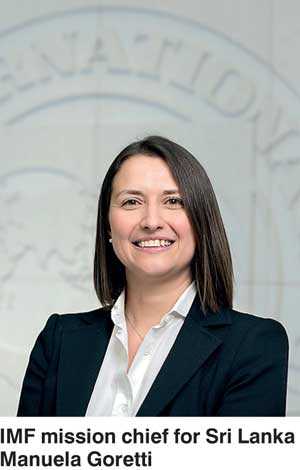Tuesday Feb 17, 2026
Tuesday Feb 17, 2026
Monday, 23 April 2018 00:32 - - {{hitsCtrl.values.hits}}

The International Monetary Fund (IMF) has signalled that it is satisfied with Sri Lanka’s stabilisation program though urging greater progress with reforms as the economy remains vulnerable.
The assessment follows the IMF reaching a staff-level agreement last week on the fourth review of the economic reform program supported by a three-year Extended Fund Facility (EFF) arrangement worth $ 1.45 billion.
After constructive discussions with the authorities in Colombo and during the Spring Meetings in Washington DC last week, IMF mission chief for Sri Lanka, Manuela Goretti, said in a statement that “all the end-December 2017 quantitative performance criteria under the program were met, as the authorities have successfully advanced fiscal consolidation and strengthened international reserves.”
The statement also said that due to a weather-related spike in food prices, inflation exceeded the upper limit for the inner band for December but has since fallen back within the inner band. The authorities are taking actions to implement all the pending structural benchmarks for this review, despite some delays. Following subdued growth in 2017 due to the lingering effects of weather-related shocks, a recovery is underway as agriculture has started to rebound and food prices have decelerated. Real GDP growth is expected to reach 4% and inflation is to remain below 5% in 2018.
Exports are also recovering and the recent sovereign bond issuance was successfully oversubscribed. However, the economy remains vulnerable to adverse shocks given the still sizable public debt, large refinancing needs and low external buffers.
Subject to Cabinet approval of an automatic fuel pricing mechanism—consistent with the EFF-supported program - the IMF Board is expected to consider Sri Lanka’s request for completion of the fourth review in June 2018.
The measure would represent a major step towards completing energy pricing reforms in 2018.
Further, efforts remain needed to strengthen governance and mitigate fiscal risks from state-owned enterprises (SOEs). Progress in implementing the Inland Revenue Act (IRA) and other revenue measures in the 2018 Budget remain essential for meeting social goals and improving debt dynamics. The Central Bank should continue to remain vigilant in guarding against inflationary pressures, while continuing to build reserves and supporting greater exchange rate flexibility.
Under the EFF-supported program, sustaining the reform momentum is critical to strengthening the resilience of the economy to shocks and promoting inclusive and strong growth. The authorities should push ahead with their Vision 2025 objectives by further advancing fiscal consolidation through stronger fiscal rules and SOE governance; modernising monetary and exchange rate frameworks; accelerating their inclusive growth reform agenda through trade liberalisation, climate and gender budgeting; as well as better-targeted social protection programs.
In December 2017, following the completion of the third review, the IMF approved the release of $ 251.4 million as part of the EFF bringing total disbursements to $ 760 million.
The Government’s reform program, supported by the IMF, aims to reduce the fiscal deficit, rebuild foreign exchange reserves and introduce a simpler, more equitable tax system to restore macroeconomic stability and promote inclusive growth.